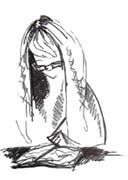 Subtitled "A Novel About the History of Philosophy," SOPHIE'S WORLD is, yup, about the history of philosophy. And since it's right there on the cover of the book, well, I really should've seen it coming--but I suppose I held out hope that SOPHIE was more "novel", less "history of philosophy"...
Subtitled "A Novel About the History of Philosophy," SOPHIE'S WORLD is, yup, about the history of philosophy. And since it's right there on the cover of the book, well, I really should've seen it coming--but I suppose I held out hope that SOPHIE was more "novel", less "history of philosophy"...But alas. I hoped in vain.
Gaarder packs a lot of information into a rather flimsy, though no doubt intriguing, plot about a girl in Norway (right? She is in Norway, isn't she?) who finds a mysterious envelope in her mail box--no stamp or nothin'--that asks the simple but oh-so-complex question, Who are you? And so Sophie finds herself involved in a philosophy course, taught by a shady stranger who drops envelopes into her mailbox at night.
Okay, we're starting off all right, here. But then you must keep in mind that probably 75% of the text are the actual pages that Sophie's reading for her course: page after page about Socrates and his pals. And this was interesting, but it was nothing beyond what I'd learned in Philosophy 101. My point: either the plot or the information needed to be stronger in order for them to hold each other up--but in this case, neither were particularly sturdy. Both were "interesting", but neither had much muscle at all.
Generally, I can't stand novels written with an agenda (like, oh, Left Behind or The DaVinci Code, both of which I've read and neither of which I particularly cared for). The information may be interesting as all get out, but I always feel cheated because the characters tend to be embarrassingly shallow, since they were fabricated out of sheer necessity to fit into some weak plot in an effort to get the Information across.
Rayford Steele. Seriously.
Now, to back up a step, Sophie and her mysterious philosophy teacher aren't as lame as Rayford Steele and Co., but they're never allowed to develop much--not as characters. Sure, Sophie starts questioning her existence, and she's a clever, feisty girl, but something vital is missing--and I think the problem lies in the fact that she resembles more a high school philosophy teacher's ideal student, rather than an actual high school student.
She's a bit too feisty, too eager to learn.
And so it is with each of the characters--they tend to match what you might think a skeptical mother, or a mysterious philosophy teacher, or a kind father might be like, rather than feeling like a character you know by the end of the book. A character so vivid, they feel like a real person.
The philosophy stuff is interesting, especially if you're interested in philosophy, but it didn't really get my attention until ridiculously late in the book, with the introduction of Kierkegaard, Neitzsche and Freud (Wow. All those names are very difficult to spell). Those guys are fascinating. Plato and pals I've heard about lots of times, but Freud? He's bizarre. But fascinating.
To wrap it up: I spent an awful lot of time wondering what was happening, and then I spent a lot of time wondering why it was happening at all. The story's kind of fun, but it's strangely awkward (perhaps a translation issue, or just awkward writing?) and the characters, alas, are a bit thin.
If you're into philosophy but not into text books, check it out. If you're into novels primarily, but with a slight aftertaste of philosophy, you might pass this one by.
RATING: 2

No comments:
Post a Comment